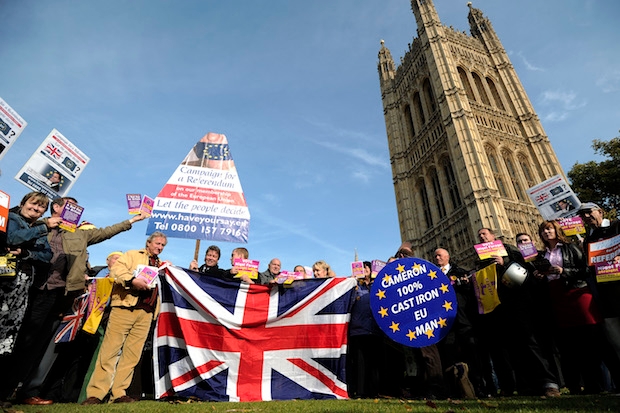The new wording of the EU referendum question seems to have helped the Brexit cause. Since the Yes/No question changed to Remain/Leave, support for staying in the European Union appears to have ebbed away. According to a new ICM poll 40 per cent now say they’d vote for Britain to leave the EU, compared to 43 per cent who would vote to remain In. This three-point gap is within the usual margin of error for opinion polls, making it too close to say who is ahead. But happily for campaigners, 17 per cent said they still ‘don’t know’ how they will vote in the referendum.
ICM conducted a poll based on the old wording two weeks again, in which 46 per cent said they would vote to remain in the EU, compared to 35 per cent who support leaving. Dominic Cummings, who is working on the ‘No’ campaign with Business for Britain’s Matthew Elliot, points out on his blog that Eurosceptics are much more enthusiastic about their cause — 56 per cent of Leave supporters say are enthusiastic about the approaching referendum, compared to 23 per cent of those in the Remain camp.
Just over half of Remain voters are neutral about the prospect of a referendum, compared to 28 per cent of those backing the Leave campaign. And 22 per cent for Remain are unenthusiastic about the vote, compared to 13 per cent of Leave voters. When the referendum campaign kicks off properly, the enthusiasm of each side is going to be key on the campaign trail to build up public support. EU membership, after all, is not the most exciting topic to engage voters.
The dynamics of referendum have also shifted recently thanks to Jeremy Corbyn. Previously, it was assumed that Labour would back a Remain vote under any circumstances, but it’s less clear what the party will do under Corbyn. Although the new Labour leader has said he is inclined for Britain to remain in the EU, he warned Labour MPs last night that his party ‘can’t just give Cameron a blank cheque’.
Leave campaigners see Corbyn’s victory as a mixed result for their side. On the one hand, there is a greater chance that Labour will have a free vote on the referendum — which makes it easier for left-wing Eurosceptics to have their voice heard. But if Corbyn ends up campaigning for a Brexit, it could be painted as a throwback to the 1975 referendum, when Tony Benn was one of the main voices campaigning for Britain to leave. Eurosceptics are hoping to paint a positive image of Britain going out of Europe and into the global market. The image of the old socialist Corbyn arguing about workers’ rights doesn’t particularly chime with their plans.






Comments